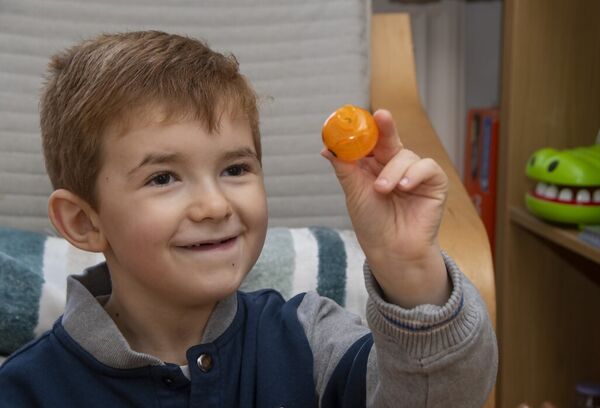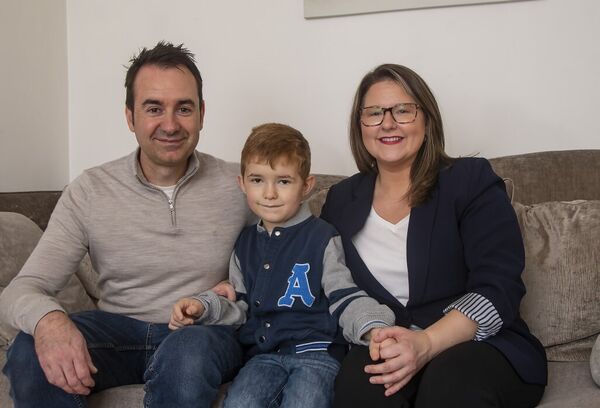Owen's story: Resistance to Thyroid Hormone Alpha
Owen is a nine-year-old from Ackworth who lives with an ultra-rare condition, Resistance to Thyroid Hormone alpha, which has only been detected in 30 people worldwide.

Owen’s story

Owen, a nine-year old from Ackworth, is doing well at school and enjoying life with his friends. But only five years ago, he was struggling to walk or talk, and his parents feared that he might not be able to grow to enjoy a healthy and fulfilled life. His developmental delays left doctors baffled, and it wasn’t until Owen joined the 100,000 Genomes Project that he finally got a diagnosis.
The test discovered a mutation in the THRA gene – a rare condition which has only been detected in 30 people worldwide. Sadly, Owen wasn’t diagnosed until he was 5 years old, meaning his family went through years of uncertainty, appointments and invasive treatments. Identifying his condition has meant that Owen could finally begin life-changing treatment – which has given him the best shot at a fulfilling future.
Discovering Owen's condition
Owen’s parents first became concerned about his health when he was around six months old, and he couldn’t sit up by himself. As time went on, he also struggled to walk and say his first words.
“It was hard for him in terms of his movement and his coordination in particular,” Owen’s mum, Sarah, said. “And he was quite insecure about movement, so often his dad and I had to be with him to do most activities.”
By the age of four and a half, Owen could say just 20 to 30 words. However, the cause of his condition remained a mystery to both doctors and his parents.
The nine-year-old had spent years having tests and invasive treatments to understand why he was not growing and was unable to walk unaided or talk properly. These included steroid trials, blood transfusions and growth hormone injections. But none brought his parents closer to any real answer.
“We were told some people just never get a diagnosis,” Owen’s dad Rob explains, “which is obviously not an easy thing to hear. And it was at that point that we were entered into the 100,000 Genomes Project.”

Getting a diagnosis
Owen’s diagnosis came when he was four and a half years old after he joined the 100,000 Genomes Project. The test, which sequenced his entire genome, identified the genetic change in the THRA gene that stopped his body from responding properly to thyroid hormones.
“We discovered resistance to thyroid hormone alpha in 2012,” Owen’s physician Professor Krishna Chatterjee at Addenbrooke’s Hospital, said. “A condition due to a genetic mutation in one of the thyroid hormone receptors. This condition is very difficult to diagnose because although patients don’t respond properly to thyroid hormone in their tissues, blood levels of thyroid hormone are virtually normal.”
Being diagnosed with the rare genetic thyroid condition meant that Owen could finally be put on simple thyroid medication. His condition can be treated with high doses of thyroxine, which he now takes as a daily tablet.
Today Owen’s condition has improved dramatically. His walking and coordination is better, he has grown significantly, and his metabolic rate is improving, meaning he has lots more energy. His parents remain hopeful for his future.
Speaking about the diagnosis, Sarah adds: “For me it was transformational. To get that specialist support and information so we could understand what might happen for Owen in the future, it was a gift.
“I just want Owen to have a full and fulfilled life, and as part of this project we’ve found out so much about Owen and he has the best chance now.”
How whole genome sequencing can help children like Owen
Sadly, Owen wasn’t diagnosed until he was five years old. In the years waiting for a diagnosis, he fell behind with developmental milestones and growth and developed anaemia. It also meant his family went through years of uncertainty and continuous medical appointments and invasive treatments.
Owen is an example of a child who could have benefited from the Newborn Genomes Programme. The research study, which is being run in partnership with parents and the NHS, will sequence the genomes of up to 100,000 babies shortly after they are born with the aim to speed up diagnosis of rare, treatable conditions like Owen's.
Speaking about the programme, Owen’s dad, Rob, said: “For Owen it would have avoided unnecessary testing and treatment and would have given him the best chance of reaching his potential by helping his development from an early age.”
“The pilot is a great advance in testing that will give families the opportunity to start treatment very early on in their child’s life.”